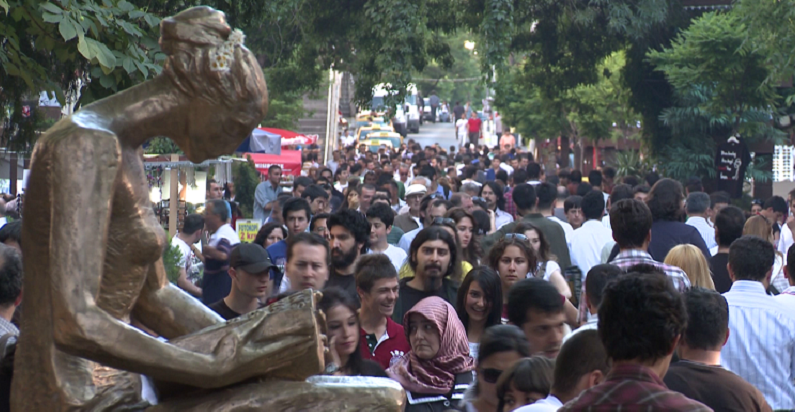-
28 November 2014
Category : Opinion
The Ombudsman Turkey has been waiting for
Lo intentaron varias veces años atrás, pero no fue hasta marzo de 2013 cuando anunciaron de manera oficial que Turquía ya contaba con un Defensor del Pueblo. Una figura que pretende velar por los derechos de los ciudadanos en el país euroasiático y por el buen hacer de la Administración Pública. Para consolidar sus raíces, Turquía recibe el apoyo de la Unión Europea (UE) a través de un proyecto de hermanamiento gestionado por la FIIAPP junto a Francia.They tried it several times years ago, but it wasn't until March 2013 that Turkey officially announced that it had an Ombudsman. A figure whose role it is to advocate for the rights of citizens in this Euro-Asian country and for the proper functioning of the Public Administration. To consolidate its roots, Turkey is receiving the support of the European Union (EU) through a twinning project managed jointly by the FIIAPP and France.

By the end of last year, after just nine months of operation, the Turkish Ombudsman had received over 7,000 complaints according to the institution’s own statistics. The main sources of dissatisfaction: the civil service, local administrations, education, access to the university, and social security. “We’re working to assist citizens in matters that concern them. We’re also trying to avoid problems between citizens and the administrations, and help administrations improve their services”, the first and current Turkish Ombudsman, Nihat Ömeroglu, explains to the FIIAPP.
A recently created institution that is independent of the Government and has a long road ahead of it. “I hope it is respected and effective figure. I suppose that a country as large as Turkey, with such an enormous population, is complex, but they will be capable of designing an organization that encompasses the entire territory and reaches all citizens. We are going to show them how we operate, orient them and provide all the necessary information and help to also make it a very effective ombudsman, indicates Spanish Ombudsman Soledad Becerril. This institutionadds 30 years of experience to that of France, which the two countries will work to share with Turkey in the course of this two-year cooperation project financed by the EU with 1.6 million euros.
Assistance to refugees
In addition to focusing on the most common complaints, the Turkish Ombudsman wishes to assist with other types of needs, such as helping the Syrian population migrating to Turkey to escape the civil war that has been plaguing that country for the past four years. According to Amnesty International, a total of 1.6 million Syrians have crossed the Turkish border since 2011, of which 220,000 live in refugee camps. The rest of the Syrian population in Turkey is living in different parts of the country. “They are very interested in talking about immigration with a country like Spain and an institution like this one”, emphasizes Carmen Comas-Mata, head of the Office of the Ombudsman in Spain and the Spanish director of the project FIIAPP is managing. This same institution will make Turkey focus on other issues, such as the prevention of torture in prisons. “We are the national mechanism of torture prevention in Spain; in Turkey, they are not, but they are also able to visit detention facilities, and therefore we are also going to try to help them in this as well, and to tell them how they might do things”, adds the expert.
From paper to practice
The goal is clear: now all that is needed is to take the steps to reach it. Steps that have been materializing since last April with a preliminary identification of needs by the Turkish Ombudsman, followed by theoretical and practical training and experience exchanges from Spanish experts to Turkish ones, in addition to a review of the legislation pertaining to this institution according to that of other countries in the European Union. All for the purpose of strengthening its management.
“The training sessions must focus, above all, on the process of managing complaints, in other words, how the incoming complaint is managed up to when the Ombudsman provides a solution”, explains Arantxa Díaz, the FIIAPP expert sent to coordinate the project on the ground, but she adds, also on the area of the rights of women, children, individuals deprived of their liberty and refugees. Turkish civil servants will also be trained, both in Turkey and in Spain and France, to mediate between citizens and the Administration, and to establish relationships between the institution and Parliament, other public institutions and NGOs. They will also be trained on how to strengthen the channels for publicizing the institution which is, at the moment, not well known—“how to introduce itself on the Internet, social network and in the news media”, explains Díaz regarding her communication plan.
Within this area, the Spanish Ombudsman will review the complete independence of its Turkish counterpart, as without this, the ultimate benefit of the project will not be achieved: protection of the rights of Turkish citizens.
The views and opinions expressed in this blog are the sole responsibility of the person who write them.






